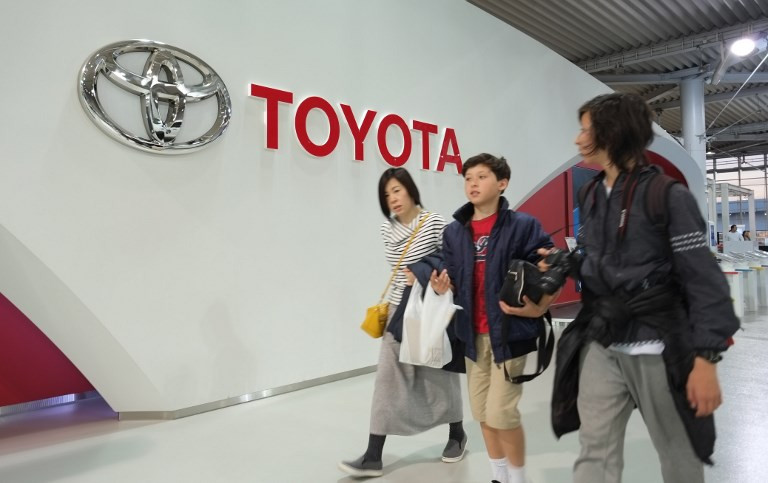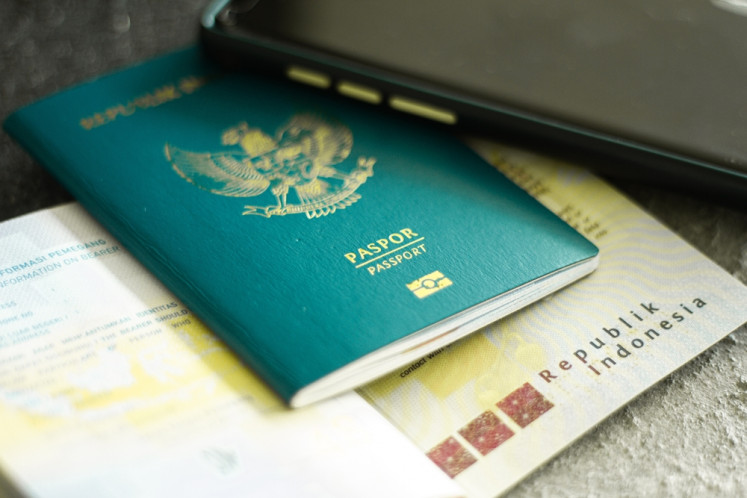Bumpy road: Toyota Astra expects national car sales to fall below target
Gaikindo special staff member Stefanus Soetomo warned that the association might have to cut its sales forecast even further.
Change Size
 Visitors walk past the Toyota Motor Corp. logo in a Tokyo showroom on Jan. 6, 2017. (AFP/Kazuhiro Nogi)
Visitors walk past the Toyota Motor Corp. logo in a Tokyo showroom on Jan. 6, 2017. (AFP/Kazuhiro Nogi)
C
ar maker PT Toyota Astra Motor, which commands a plurality of the Indonesian automobile market, has projected the country's car sales to fall below expectations after two months of weak sales.
Toyota Astra marketing director Anton Jimmi Suwandy said the wholesale numbers booked by the industry in recent months were below expectations and were not on target to meet the Association of Indonesian Automotive Manufacturers’ (Gaikindo) year-end goal of 600,000 sales.
“Gaikindo agreed to the 600,000 target for total full-year market sales this year. But as we look at the past few months, [car sales] are not in line with the hopes of achieving 600,000 cars sold,” Anton said at a virtual media briefing on Monday.
“Hopefully, the gap is not too far from 600,000, [perhaps] around 550,000 or above. That’s our hope,” Anton added.
Gaikindo cut its 2020 domestic car sales target by 40 percent to 600,000 earlier this year as pandemic restrictions slowed economic activity and weakened purchasing power. Last year, the country’s auto industry sold just over 1 million cars.
Gaikindo special staff member Stefanus Soetomo said on Sept. 17 that the association would have to rethink its current target as the COVID-19 pandemic was lingering longer than expected. He warned that it might have to cut its sales forecast even further.
Despite national car sales rebounding to 37,200 in August and 25,200 in July, Stefanus said, the figures were still well below the association’s target of 80,000 cars in August alone.
Toyota, which had a 30.2 percent plurality of the Indonesian automobile market as of August, sold 97,728 cars on the wholesale market in the first eight months of the year.
On the retail market, the subsidiary of diversified conglomerate PT Astra International sold 115,553 cars from January to August – a 31.7 percent share of the market. During the same period last year, the company sold 212,888 cars.
“Indeed, the biggest impact from COVID-19 occurred in April and May,” Anton said. These were the months that the government enforced strict movement restrictions in response to the virus crisis. Toyota sales dropped 79 percent yoy to 6,727 in May, the lowest monthly sales the company has booked so far this year.
Despite falling sales in many of Toyota Astra’s products, Anton reported that the company had seen an increase in sales in the Hiace minibus and the Corolla Cross Hybrid.
“With the assumption of 30,000 to 40,000 [cars sold] a month, our conservative expectation for car sales is 400,000 by the end of the year,” Koneksi Kapital equity analyst Alfred Nainggolan told The Jakarta Post on Tuesday.
“If the large-scale social restrictions [PSBB] don’t go on for long, it will be possible to reach 500,000 units,” he said, adding that selling 600,000 cars would be a difficult feat.
Alfred said retail sales – purchases by end-users – would be higher than wholesales – purchases by dealers for sale on the retail market. This was because showrooms preferred to keep a limited number of products on site as sales slumped.
Gaikindo data shows that as of August, 364,034 cars were sold on the retail market, while 323,507 were sold wholesale, annual decreases of 52 percent and 51 percent, respectively.
In addition, Alfred said the overall downturn in the automotive industry would, nonetheless, negatively affect Toyota and its parent company.
“In the second half of the year, we see potential for a 40 to 50 percent decrease in [Astra’s] bottom line,” Alfred said, noting that a large chunk of Astra Group’s businesses were in the auto industry and its derivatives.
Astra’s net profit fell 44 percent yoy to Rp 5.5 trillion in the first half of the year as the pandemic dealt a heavy blow to the automotive industry and commodity prices.
Andrey Wijaya, an analyst at RHB Sekuritas, expressed optimism that consumption would gradually recover next year as the pandemic subsided and would eventually positively affect car sales.
“In 2020, the performance of car sales will be low, but I am certain that there will be a recovery next year as the COVID-19 pandemic is expected to be resolved with the distribution of vaccines,” Andrey told the Post on Tuesday.









